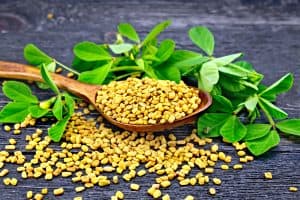
Fenugreek Lovely Herbs – A Shutterstock Licensed Image
Fenugreek is a luscious, healing cousin to soy, and its dried leaves, twigs, seeds, and roots are used to heal a variety of conditions, and add delicious spice to several unique dishes.
For thousands of years, this potent medicinal plant has been used by healers and shamans and has been a staple in Chinese medicine. The Fenugreek plant grows to two to three feet and has green leaves and white flowers. Along its thin stems and branches, you’ll find golden pods, each of which contains gold and brown seeds.
80% of Fenugreek is produced in India. With its distinct sweet and nutty flavor, it’s common to see Fenugreek leaves added to dishes throughout India, including bread and sandwiches like “Aloo Methi Naan” and Aloo Methi Ka Paratha” (potato fenugreek). You’ll also find Fenugreek in a variety of Aloo Methi entrees.
A typical household spice in Iraq, China, and India, this diverse plant has a variety of benefits.
Fenugreek Benefits
Whether it’s Fenugreek tea benefits, or the benefits of Fenugreek oil or Fenugreek seeks, this earthy supplement packs a lot of value. While not all studies point to success in every category, there is now enough evidence to support most of the following benefit claims successfully.
- Benefits for hair include the promotion of hair growth and stronger hair follicles
- Bacterial, fungal, and viral infections
- Constipation
- Inflammation
- Decreased risk of cancer
- Fenugreek benefits for women include new mothers who found an increase in breast milk production
- Fenugreek benefits for men include increased libido and sexual strength, and improved sexual function
- Increases carb tolerance
- Improves insulin function
- Appetite control and weight loss
- Lower cholesterol and triglyceride levels
- Heartburn, potentially equal to popular antacid medications
Fenugreek Side-effects
While it seems the verdict points to excellent, not everyone is a fan of Fenugreek for everyday usage. Confirmed solely in animal studies, high doses of Fenugreek have caused DNA damage, decreased fertility, neurological problems, and increased chances of miscarriage. Some scientists are alarmed by the trending use of Fenugreek as a dietary and nutritious supplement.
Here are some of the challenges experienced by human adults and children who participated in Fenugreek studies:
- Allergic reaction
- Asthma
- Diarrhea
- Indigestion
- Gas (flatulence)
- Low blood sugar (hypoglycemia)
- Wheezing
- Unusual body odor (children only)
- Loss of consciousness (children only)
Maca (Lepidium meyenii, Peruvian Ginseng)
To many, Maca has super-secret super-powers and is known to improve energy and stamina, enhance sex drive, and improve fertility in both men and women. It’s also been reported that Maca can save relationships and reinvigorate self-esteem.
Well, at least that’s what they say.
Originally cultivated in the harsh climate and high altitude of the Peruvian mountains, it’s often harvested for its powerful root. Maca is considered to be a cruciferous vegetable with famous cousins that include broccoli, cauliflower, cabbage, and kale.
Given the problematic landscape and unique attributes of Maca, it’s always harvested manually. Farmers tend to extract the nutritious Maca root for production and then spread the leaves to fertilize their fields. They’ll also leave it for their livestock to consume.
Similar to radishes and turnips, Maca has other benefits, making it a unique and beneficial supplement. Maca can be added to salads, smoothies, breakfast cereals like oatmeal and corn flakes, and can be sprinkled into baked goods, home-made energy bars, and many meals.
Maca Benefits
Maca is an adaptogen, which means it helps your body fight stress and improves homeostasis, your internal processes that maintain your stability in response to changes in external conditions. Whether it’s Maca powder benefits or its root powder benefits, many people are finding that Maca is helpful and wholesome.
Here’s what we know right now:
- Maca is nutritious, chock full of helpful nutrients
- Backed by some convincing studies, it seems that Maca boosts sexual performance and function
- Might relieve menopause symptoms, and the mental and emotional highs and lows experienced during menopause
- Improves self-esteem
- Improves energy levels
- Anemia or “tired blood”
- Improves mental clarity, learning, and memory
- Reduces depression and anxiety
- Boosts sports performance and endurance, and enhances muscle mass
- In lotions, it may help protect your skin from sun damage
- May reduce the size of the prostate
- While it was initially believed that Maca provided benefits for men, studies consistently show that Maca offers equal benefits for women
Maca Side-effects
Before adding Maca to your regular diet, it might be best to seek the advice of a nutritional expert. While Maca is a medicine that appears to improve circulation and provide a variety of other benefits, Maca research and mass production is in its infancy.
- Like all cruciferous vegetables, people with Thyroid issues would limit their intake of Maca, as it could have adverse effects
- Pregnant and breastfeeding women might want hold-off on consuming Maca until after the birth and breastfeeding of their children
Mucuna (Mucuna Pruriens, Mucuna pruriens inflorescence)
If you’re looking for a magic pill to help boost your mood, improve your libido, and help you feel better about life, you might explore Mucuna pruriens, the natural herbal supplement used in Ayurvedic medicine.
Mucuna pruriens is a popular, mass-produced legume (a member of the pea family), native to Africa and Asia. Other names for this happy bean include Bengal velvet bean, Florida velvet bean, Mauritius velvet, Cowage, Lacuna Bean, and the Lyon Bean.
It has been used in Ayurvedic medicine for thousands of years to treat diseases, including Parkinson’s disease. It’s also been used in Unani or Yūnānī (Greek) medicine (Perso-Arabic system of medicine given to us by the Greek physicians Hippocrates and Galen), to heal many diseases and dysfunctions.
Mucuna pruriens is considered an effective, alternative treatment for Parkinson’s because of its high content of L-dopa. This amino acid converts to dopamine, that feel-good chemical that helps us learn to regulate our body movements, process emotions, and create normalized emotional responses. Also interesting is that Mucuna pruriens is one of the only natural sources of L-dopa.
In short, dopamine contributes to being productive, adds to feelings related to pleasure, and can support experiences where the individual feels a sense of satisfaction.
Mucuna Pruriens Benefits
- Effective treatment for Parkinson’s disease
- Reduces feelings of depression
- Increases sperm count and libido
- Improves sexual function
- Reduces menstrual discomfort
- Helps to treat male infertility
- Antimicrobial, Antifungal, Antibacterial
- Anti-diabetic properties
- Antioxidant
- Mucuna pruriens benefits bodybuilding
Mucuna Pruriens Side Effects
While many herbs and plants can be beneficial to human beings, they can also be dangerous for us. In the case of Mucuna pruriens, there is enough evidence to support its value to a variety of conditions, but there are dangers. Be very careful when self-prescribing this powerful supplement, in any form. You’ll be safest when consulting a doctor or nutritional expert.
Here are the potential side effects you’ll want to consider before consuming any size portion of Mucuna pruriens.
- Agitation
- Increases in addictive behavior
- Compulsive gambling
- Over-spending
- Hyper-sexuality (dysfunctional obsession with sexual fantasies)
- Binge eating
- Anger
- Hallucinations
- Delusions
- Nausea
- Nervousness
- Feelings of abdominal bloating
- Vomiting
- Abnormal and spontaneous body movements
- Insomnia
- Excessive dreaming and thinking
- Headache
- Temporary fast heartbeat





